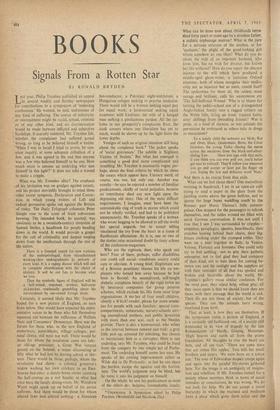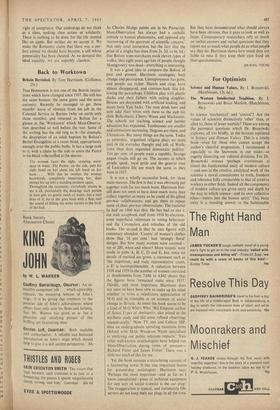BOOKS
Signals From a Rotten Star
BY RONALD BRYDEN AST year, Philip Toynbee published an appeal Li in several weekly and Sunday newspapers
for contributions to a symposium of 'underdog confessions.' He wanted, he said, testimonies of any kind of suffering. The source of inferiority or mistreatment might be racial, sexual, criminal or of any other kind, and. no discrimination would be made between inflicted and subjective hardships. It scarcely mattered, Mr. Toynbee felt, whether the complainer had suffered actual wrong, so long as he believed himself a victim.
`When I was in Israel I tried to arrive, by con- stant inquiry, at some adequate definition of a Jew, and it was agreed in the end that anyone was a Jew who believed himself to be one. How much more is anyone an underdog who sees himself in this light?' It does not take a wound to make a cripple.
What was Mr. Townbee after? The emphasis of his invitation was on grudges against society, and his project inevitably brought to mind those
other recent symposia, Declaration and Convic- tion, in which young writers of Left and radical persuasion spoke out against the Britain of today. The Daily Telegraph columnist Peter Simple rose to the scent of fresh subversion brewing. The intended book, he snorted, was obviously to be a twentieth-century inversion of Samuel Smiles, a handbook for people heading down in the world. It would provide a gospel for the cult of criminality and despair seeping down from the intellectuals through the rest of the nation.
There is a frenzied search for new varieties of the underprivileged, from misunderstood working-class undergraduates to perverts of every kind. It is a raging disease which will end in complete identification with the object of idolatry. It will be our fate to become what we love.
Then the symbolic figure of England will be
a half-witted, impotent, armless, half-caste
pickpocket, continually grumbling about his mistreatment by one-armed foreign rivals.
Certainly, it seemed likely that Mr. Toynbee hoped for a new picture of England, as seen from below. One would have expected his repre- sentative voices to be those who felt themselves squeezed out between the millstones of Welfare State and Consumers' Democracy. Here was the forum for those who, in the new England of motorways, point-blocks, village colleges, pre- natal clinics, still were not well. There would be those for whom the revolution came too late: an old-age pensioner; a Great War veteran gassed on the Somme; a miner discovering at fifty what he had lost by leaving school at thir- teen. There would be those, perhaps, whom the revolution had shorn : a colonial governor's widow washing her own crockery in an East- bourne bed-sitter; a stately-home owner counting the half-crowns on a wet Sunday in what had once been the family dining-room. Mr. Woodrow Wyatt might speak up on behalf of his surtax sufferers. And there would be those for whom altered laws had altered nothing: a Jamaican
bus-conductor, a Pakistani night-watchman, a Hungarian refugee seeking to practise medicine. There would still be a woman seeking equal pay for equal work; a homosexual seeking equal treatment with Lesbians; the wife of a hanged man seeking a posthumous pardon. All the rat- holes in our prosperity's complacent floor, the dank corners where our liberalism has yet to reach, would be shown up by the light from the lower depths.
Vestiges of such an original intention still hang about the completed book.* The jacket speaks of 'social grievances.' The subtitle is 'Eighteen Victims of Society.' But what has emerged is something a good deal more complicated and troubling. Mr. Toynbee is necessarily vague, per- haps, about the final criteria by which he chose the essays which appear here. Literary merit, of course, was one, but only one. Another was novelty—he says he rejected a number of familiar predicaments, chiefly of racial prejudice, because no contributor shed any new light upon the depressing old story. One of the most difficult requirements, I imagine, must have been the unmistakable ring of truth in stories which could not be wholly verified, and had to be published anonymously. Mr. Toynbee speaks of a woman who wrote begging to be allowed to tell the world her special anguish, but in actual telling smothered the cry from the heart in a tissue of flamboyant affectation. As it is, one or two of the stories raise occasional doubt by tinny echoes of the confession-magazines.
Who are the eighteen, then, who speak out here? Four of them, perhaps, suffer disabilities you could call social--conditions society could cure or alleviate. A young thief, illegitimate son of a Brixton prostitute, blames his life on em- ployers who turned him away because he had been to Borstal. An unemployed, self-taught diabetic complains bitterly of the rigid terms set by insurance companies for group pension schemes, which exclude his like from most large organisations. A molter of four small children, clearly a Which?-reader, pleads for more ameni- ties for people with such families: special train- compartments, restaurants, nursery-schools serv- ing unemployed mothers, and public lavatories with more than one seat, such as the Swedes provide. There is also a homosexual, who writes in the interval between remand and trial: a grey little pick-up, arrested for soliciting, has chosen to incriminate him as a corrupter. Here is one underdog, says Mr. Toynbee, who could be freed from the category by one simple act of Parlia- ment. The underdog himself seems less sure. He speaks of his coming imprisonment rather as
Wilde did in De Prof undis: at last he can share the burden, escape the squalor and the furtive- ness. The world's judgment may be blind, but he turns it into his judgment on himself.
On the whole, he sees his predicament as most of the others do: helpless, irremediable, lonely.
,
• UNomwoos. A Symposium edited by Philip
Toynbee. (Weidenfeld and Nicolson, 21s.)
What can be done now about childhoods terro- rised forty years or more ago by a drunken father, a sadistic orphanage matron? What is the cure for a nervous stricture of the urethra, or or 'uncharm,' the plight of the good-looking girl whom somehow no one likes? What do you do about, the wife of an impotent husband, who loves him, has no wish for divorce, but knows her life withered? How do you repair the obscure injuries to the will which have produced a middle-aged ghost-writer, a lustreless Oxford crammer, both of whom recognise their medio- crity not as injustice but as mere, rancid fact? The spokesman for them all, the oddest, most savage and brilliant, calls his anonymous cry 'The Self-Inflicted Wound.' Who is to blame for turning the public-school son of a distinguished Anglo-Indian family into a ragged solitary on the Welsh hills, living on trout, trapped hares, stray shillings from dwindling friends? WaS it pride, or a kind of shyness; or was solitude the perversion he embraced as others .take to drugs or masochism?
To a lonely child the seducers are Mole, Rat and Otter, Huck, Quatermain, Bevis, the Co;ral Islanders, the young Tarka chasing the moon across the meadows from the black-and-silver- sliding Taw. . . . Once you sign with that mob, if you think you can ever pull out, you'd better get wise to yourself. They'll follow you wherever you go and sooner or later put the finger on you, lisping the low and delicious word 'Nuts.'
And there is no rescue from that exile.
What can we feel about them? One marvellous morning in Innsbruck, I sat in an open-air caf6 trying to read a paper in the glare from the dazzling snows above the green belfries, and to ignore, the huge buses waddling south" to the Brenner past Maria Theresa's little summer palace. One stopped for the passengers to refresh themselves, and the tables around me filled with quick German conversation. It was not until I rose that I saw I was surrounded by cripples— amputees, paraplegics, spastics, hunchbacks, their crutches leaning behind their chairs, their leg- braces clashing under the cramped tables. They were on a tour together to Italy, to Venice, 'Verona, Florence and Sorrento. One could only try to feel nothing: not to pity, their pathetic enterprise, not to feel glad they had company of their kind, not to hate them for coming be- tween you and the sunlight and the sapphire air with their reminder of all that was spoiled and broken and incurable about the world. Mr. Toynbee's gallery rouse similar confusion. For the most part, they reject help, refuse pity; all they insist upon is that we should know they are there, with their message that the world is sick. Their ills are not those of society, but of the species. They are the animals born wrong, mutilated from birth.
That, at least, is how they see themselves. If the symposium yields a picture of England, it is a curiously old-fashioned one, of a society still dominated in its view of tragedy by the late Romanticism of Hardy, Gissing, Housman. 'High heaven and earth ail from the prime foundation; All thoughts to rive the heart are here, and all are vain.' 'There are some stars that are rotten like apples,' Tess tells her small brothers and sisters. 'We were born on a rotten star.' The note of Edwardian despair creeps again and again into the painful life-stories gathered here. Yet the image is an ambiguity of resigna- tion and rebellion. If Mr. Toynbee looked for a society whose members think in terms of social remedies or consolations, he was wrong. We do not look for help. We do not accept a social hierarchy in which the maimed and mediocre have a place which gives them value and the
right of acceptance. Our underdogs do not think as a class, seeking class action or solidarity. There is nothing to be done for the life stunted like an apple. But neither do we accept it. We make the Romantic claim that there was a per- fect animal we should have become, a self whose potentiality has been cheated. As we demand this ideal equality, we are superbly classless.







































 Previous page
Previous page